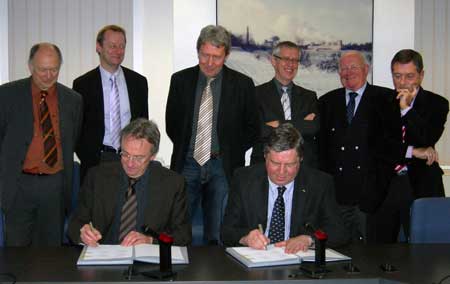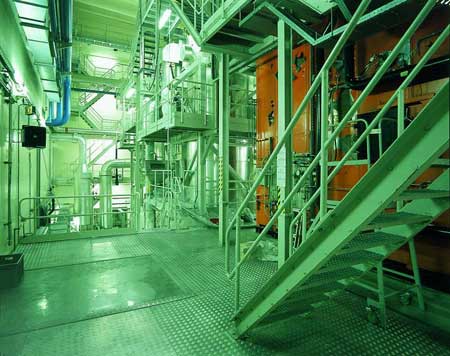
SCK-CEN and Belgoprocess join forces

On 22 December 2009, SCK-CEN and Belgoprocess signed an agreement outlining systematic collaboration in several fields of research and, more specifically, in the field of nuclear technology development. In the following interview Eric van Walle, Director-General of SCK-CEN, and Rik Vanbrabant, Director of Strategy and Business Development at Belgoprocess, explain the origins and objectives of this agreement:
SCK•CEN and Belgoprocess share operational headquarters in the “nuclear area” of Mol-Dessel, in Belgium. What triggered the idea to join forces?
|
Rik Vanbrabant: Because we are neighbours and both active in the nuclear sector our companies have overlapping fields of work and we share common interests, even though our core businesses differ. Belgoprocess offers integrated nuclear waste management and decommissioning services, driven by safety and backed by 50 years of hands-on industrial experience. We have extensive knowledge of processing and the best technologies and facilities available for the processing, conditioning and storage of radioactive waste and for the dismantling of obsolete nuclear installations, including |
heavily alpha and/or beta/gamma-contaminated cells. Our 285 employees are experts in minimising the amount of radioactive waste produced and maximising the clearance of decontaminated material, whilst at the same time optimising operational costs.
Belgoprocess focuses on nuclear waste management and decommissioning. SCK-CEN is one of the largest research centres in Belgium, offering a broad range of nuclear research programmes, services and technologies. What special expertise does SCK-CEN bring to bear?
|
Eric van Walle: Based on more than 50 years experience, SCK-CEN advances the peaceful industrial and medical applications of nuclear science with the support of its 640 employees. Our statutory mission is to give priority to issues of societal concern such as the safety of nuclear installations, radiation protection, the safe treatment and disposal of nuclear waste and sustainable development.
SCK-CEN’s activities are organised within three scientific areas: nuclear materials science, advanced nuclear systems and
|
environment, health and safety. Research is made possible through the on-site availability of several large infrastructures: two high-performing nuclear research reactors, well-equipped nuclear and non-nuclear laboratories and an underground facility focussing on nuclear waste R&D. We spread our knowledge through participation in educational programmes, training courses and communications campaigns. Our know-how and facilities are also used to provide services to the nuclear industry and community, the medical sector and the government.
Because of your proximity and partly similar activities, SCK•CEN and Belgoprocess share common interests when it comes to nuclear R&D. What are the actual benefits of the agreement?
Rik Vanbrabant: Cooperation on a systematic basis creates opportunities for collaborative procurement actions for energy, consumer goods and services that may result in important cost savings. On top of that, the efficiency and the quality of our work will increase, which should have a positive impact on the services we provide to our external clients. Joining forces and combining our expertise will strengthen both SCK-CEN’s and Belgoprocess’ competitive position both nationally and internationally. We strive for collaboration in various domains such as business development, feasibility studies, routine research and other projects, the exchange of knowledge and techniques and in the training of personnel.
Regarding training, Belgoprocess and SCK-•CEN are already working together. Why do you pay that much attention to education and training?
Eric van Walle: Because we are active in an innovative sector, it is important to update our personnel on the latest new techniques and technologies, and to improve their skills and overall well-being at work. We inform each other about our individual training programmes, which are set up to meet the specific needs of our employees. When there is a common interest in a certain topic we organise joint courses.
Furthermore, SCK-CEN offers courses on radiation protection, waste and disposal management, emergency planning, nuclear engineering and more. An overview of our education and training activities was presented in a previous edition ENS NEWS. We also work together with academic institutes and our experts lecture in courses such as those given at BNEN (the Belgian Nuclear higher Education Network) and radiation protection training courses for experts. The latter meets the legal requirements laid down by FANC/AFCN for the accreditation of the class I and II radiation protection experts. Employees of Belgoprocess participate in these courses regularly.
In 2010, SCK•CEN and Belgoprocess will start collaboration on three specific themes: the characterization and immobilisation of nuclear waste, the establishment of a joint consultative structure on nuclear liabilities and the execution of a feasibility study on plasma technology. How will this cooperation be put into practice?

Rik Vanbrabant: For each of these themes our experts will meet regularly to exchange information and plan activities. Cooperation can vary from ad hoc collaboration on certain aspects of a technology or to providing services within a more structured partnership for a specific project or topic.
For example, with respect to developing a feasibility study on the application of plasma technology, SCK-CEN and Belgoprocess will take a closer look at all aspects of building, testing and operating a plasma oven, as well as on using plasma technology for processing various types of waste. In a first phase of this project we will evaluate the new application, possible waste streams, licensing and the costs of a demonstration run. We will also look at additional financing options.
Do SCK-CEN as the research centre and Belgoprocess as the operator complement each other in the area of radioactive waste characterisation and immobilisation?
Eric van Walle: Yes, we have already defined a number of cooperation initiatives. They range from information exchange on bitumen to joint initiatives for ENTRAP (European Network for Testing Facilities for Quality Checking of Radioactive Waste Packages). Our collaboration in this area will benefit the quality of the service that we offer our customers.
Similarly, for the joint consultative structure on nuclear liabilities, SCK-CEN and Belgoprocess will look into common challenges and solutions. Here too we have defined opportunities for collaboration, ranging from making use of each other’s infrastructure to exchanging knowledge and specific expertise required during decommissioning projects.
May we conclude then that the future looks bright for SCK-CEN and Belgoprocess?
Rik Vanbrabant: Considering the good contacts that we have always maintained in the past we believe this agreement will prove to be the start of a fruitful cooperation that will benefit both organisations and will lead to strengthened national and international competitiveness.
ENS NEWS would like to thank Rik Vanbrabant and Eric van Walle for providing readers with this invaluable insight into the objectives and development of this cooperation agreement, and for providing the accompanying photos.
|

